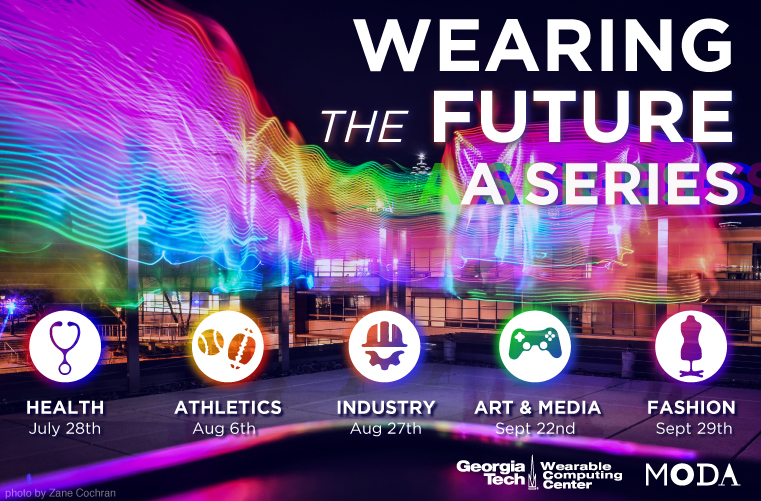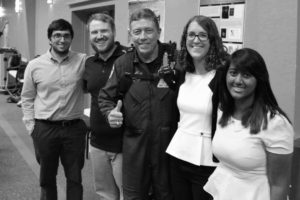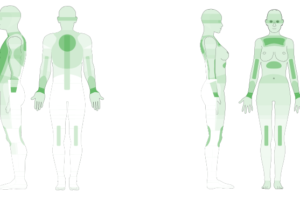
The Wearable Computing Center at Georgia Tech in collaboration with the Museum of Design Atlanta (MODA) will host a series of exciting presentations this fall to complement the exhibition
Wearing the Future will be a series of five panel discussions by thought leaders, exploring the impact of wearable technology across various domains. The sessions aim to provoke thought about the future of technology and how society will adapt and include wearable technology to drive better and newer outcomes. The panels and presentations will include academic and research experts and thought leaders from industry including trend forecasters, athletes, designers, manufacturers and health professionals.
Admission is free with regular admission to MODA, but seating is limited. Please register in advance by clicking here. Members -FREE | Non-members $10 | Military, Educators, Seniors $8 / Students $5 with valid ID.
Register in Advance – Tickets
Live Webcast HERE
HEALTH
July 28th
5:30 pm Tour of On You:Wearing Technology with co-curator Clint Zeagler
7:00 pm Panel Discussion: Health and Wearable Technology
Tickets
Advances in wearable technology will have profound impacts on our health. Healthcare could be improved and personalized by tracking trends in individual physical health. Wearable technology could provide simpler and more efficient ways of providing care, even in impoverished nations. As sensing technology improves and we are able to captures brain signals while mobile, what opportunities could this afford to even mental health? How do we keep our personal health information private but also useful to our health providers? What is the future of wellness and healthcare with the aid of personal wearable technology?
Beth Mynatt – moderator
Elizabeth D. Mynatt is the executive director of the Institute for People and Technology, and Professor in the College of Computing at the Georgia Institute of Technology. Her research program Everyday Computing examines the human-computer interface implications of having computation continuously present in many aspects of everyday life. Her research contributes to ongoing work in personal health informatics, computer-supported collaborative work and human-computer interface design. Mynatt has created new technologies that support the independence and quality of life of older adults “aging in place,” that help people manage diabetes, and that increase creative collaboration in workplaces.
Jiten Chhabra
Dr. Chhabra is an India-born physician, healthcare entrepreneur and health tech researcher at the Interactive Media Technology Center. He has over five years of experience in technology design (500NearMe), product development (SmartMenu, Rheumate), tech transfer (Sensiotec) and outcomes evaluation (ShareCare) of health and nutrition technologies. Dr. Chhabra has been an invited speaker on forums like CNN and Health 2.0 and his research has been supported by agencies like the National Science Foundation, Centers for Disease Control, National Institute on Disability and Rehabilitation Research and Google Research. Dr. Chhabra also advises students and health startups on health tech commercialization.
Raja Schaar
Raja Schaar is a design instructor for the Wallace H. Coulter Department of Biomedical Engineering at GA Tech and Emory University where she is instrumental in steering the pedagogy of the sophomore engineering design course as well as depth electives on medical device design. She works to infuse the design curriculum with human-centered design methodologies in addition to co-managing the BME machine shop. Her approach is fueled by over 10 years of experience as both an industrial designer and university design lecturer. Course topics include medical devices, interaction design, exhibition design, eco-design, biologically-inspired design, transportation, service design, and application development. Schaar pushes her students to apply design thinking and human-centered design methodologies to the development of medical device concepts.
Juliet Sekandi
Juliet Sekandi is an Assistant Professor in the Center for Global Health and Department of Epidemiology and Biostatistics in the College of Public Health at the University of Georgia. She is a Ugandan physician with a Master of Science degree and a Doctor of Public Health degree. Dr. Sekandi focuses on early detection and prevention of infectious diseases specifically Tuberculosis and HIV in Africa. Her passion is creating novel solutions that involve mobile technologies to combat global health problems and improve the health of populations. She has special interests in the emerging field of mobile health (mHealth) where she works collaboratively with professionals outside of public health and medicine disciplines such as Engineers, Computer scientists, Information technologists, to create low-cost and sustainable health solutions.
ATHLETICS
August 6th
1:00 pm Tour of On You:Wearing Technology with co-curator Clint Zeagler
2:00 pm Panel Discussion: Athletics and Wearable Technology
Tickets
Looking beyond the simple commercial fitness tracker of today, how will advanced sensors and wearable technology affect the way athletes train in the future? What innovative ways are wearable technologies enhancing team practice today, and how will this evolve? Who sees and owns data tracked on professional athletes? We can also anticipate that wearable technology will enhance the spectator’s experience. Will wearable technology allow us to get closer to the action?
Brad Stenger – moderator
Brad Stenger is a journalist, consultant and researcher based in Rochester NY. Current clients include: the NYU Center for Data Science, the U.S. Soccer Federation and the Buffalo NY startup, CoachMePlus.
A.J. Scola
AJ Scola is a 2009 alum of Amherst College where he played Football and Ice Hockey. Scola played 2 years of professional football in Germany and Spain before attending law school at the University of Connecticut. His first job in baseball was working in International Player Development and Scouting for the Cleveland Indians in 2012. Scola was hired by the Atlanta Braves in December 2012 and worked in the Pro Scouting side of the business until his move to Player Development where he is currently the Manager, Minor League Operations. Scola assists Jonathan Schuerholz in overseeing the Atlanta Braves farm system and development of the minor league players.
Peter Presti
Peter Presti is the Co-Director of the Wearable Computing Center and a Senior Research Scientist with the Interactive Media Technology Center at the Georgia Institute of Technology. During his 22 years with the university he has collaborated with companies such as IBM, Humana, Google, Microsoft, Intel, Alcatel-Lucent, Bellsouth, Denon Nippon-Columbia, and others. Government research sponsors have included DARPA, NIH, NSF, DoE, USDA, and the VA. His areas of research include sensor systems and biometrics, wearable computers, signal processing, pattern recognition, embedded systems, electronics design, data visualization and computer graphics, and computational geometry. His background spanning both custom hardware and software development provides him the skills to design and build fully integrated prototype systems, and in past projects has designed and built high-speed data capture systems, a variety of kinetic sensors, biometric sensors, and wearable computer systems.
INDUSTRY
August 27th
1:00 pm Tour of On You:Wearing Technology with co-curator Clint Zeagler
2:00 pm Panel Discussion: Industry and Wearable Technology
Tickets
Head mounted displays have been used in industry since the ‘90s for mobile on site repair and access to large amounts of locally stored information. With the advent of improved network connections and better understanding of mobile interactions these devices now have the technology and opportunity to make a huge impact in the way we manufacture. Assembly line personnel can work through checklists and order picking more affectively. Specialized mechanics can access remote experts and have real time conversations about parts through the cloud. How will even more improvements in wearable technology affect industry and manufacturing?
Thad Starner – moderator
Thad Starner is a Professor of Computing at the Georgia Institute of Technology and is a wearable computing pioneer, having worn head-up display based computers as everyday personal assistants since 1993. He is one of the technical leads on Google’s Project Glass and a founder of the IEEE Technical Committee on Wearable Information Systems. Thad’s experience with rapid prototyping has enabled his research groups to create innovative mobile and ubiquitous computing devices that often foreshadowed current commercial products such as mobile MP3 players, mobile context aware search systems, multitouch augmented desktops, and mobile computer vision-based augmented realities.
Sam Kellet Jr.
Sam Kellett, Jr. is the Chairman, CEO, and Co-founder of United Sciences, LLC. Sam is responsible for establishing and executing the overall strategic direction of United Sciences and is very involved in driving precision 3D hole scanning solutions. Before United Sciences Sam was a successful entrepreneur with over 18 years of experience in the technology, logistics and healthcare sectors. Sam was founder and CEO of a technology company that he sold to Reed Elsevier. Sam is also an advisory board member at the College of Computing at the Georgia Institute of Technology and was also appointed by the Governor of Georgia to the Jekyll Island Port Authority Board and Public Schools Retirement Pension Board. Sam holds an undergraduate degree from North Carolina State University and holds an MBA from the University of Georgia.
ARTS & MEDIA
September 22nd
5:30 pm Tour of On You:Wearing Technology with co-curator Clint Zeagler
7:00 pm Panel Discussion: Arts & Media and Wearable Technology
Tickets
Wearable Technology sensing combined with Virtual Reality VR and Augmented Reality AR advances will not only form how we will consume media in the future, but also how we create it. Facebook took a step towards validating the future of VR/AR media display with the highly publicized purchase of Oculus Rift. We should also look to how wearable technology can aid in creation, how choreographers and musicians can use this technology in performance and in composing new works. Lets look at advancements in gaming to what the future might hold. Can we become part of the story?
Madison Cario – moderator
Madison Cario is the Director of GT Arts and comes to Georgia Tech from The Annenberg Center for the Performing Arts at the University of Pennsylvania, where she served as Director of Student Engagement, Director of Special Artistic Initiatives, and Director of Operations and Facilities. Cario holds a Master of Science in Environmental Studies from the University of Pennsylvania and a Bachelor of Arts in Rhetoric and Communication, Summa Cum Laude, from Temple University.
Maribeth Gandy Coleman
Dr. Maribeth Gandy is the Director of IMTC, Co-Director of the Wearable Computing Center, as well as the Associate Director of Interactive Media for the Institute for People and Technology. She does research in the areas of augmented reality, mobile computing, and HCI. She is a computer scientist who is interested in not only building interesting mobile applications, accessible interfaces, and AR experiences but in bringing HCI techniques for design and evaluation into these domains. Maribeth has worked on a wide array of projects in the 12 years she has been a faculty member at Georgia Tech; ranging from an augmented reality prototyping tool, to an accessible computer interface based on gesture, to a virtual reality experience for exposing theater students to vaudeville. She is currently collaborating with NC State on an NSF funded project to develop cognitive games for older adults She is currently developing presence metrics for measuring engagement in AR environments using qualitative and quantitative (physiological measures) data. She also teaches the “Video Game Design” course and the “Principles of Computer Audio” (which she created in 2001) in the College of Computing at Georgia Tech.
Rocco Centrella / Rhó
The Talented and multi-strumentalist Rhò, studied music extensively when he was growing up thanks to a kind uncle who saved him from playing football every night with the other kids. Born Rocco Centrella, the young maverick has a unique relationship with sound. Balance is key to the work of Rhò, whose voice travels to some unusual and very Italian harmonic vistas, mixing folk and electronic. Rhó worked with the Georgia Tech Wearable Computing Center to create ‘The Hood’ which is on display in the current exhibition at MODA. He used the garment to develop and play new musical compositions, activated by the body and tangble interaction during performance.
Vu Ha
Vu Ha is a software engineer at Funomena, an AR/VR game studio, where he works on an experimental augmented reality game called Woorld which is targeted towards handheld devices utilizing Google Tango. Before that, he worked at Electronic Arts/Maxis for 3 years on SimCity and new IP development. He has also worked closely with Qualcomm’s Augmented Reality SDK (Vuforia), helping to create the Rock’em Sock’em AR demo showcased during its initial launch. He holds an undergraduate degree in Computational Media and master’s degree in Computer Science from Georgia Tech. During his master’s program he worked on the AR game Nerdherder.
Lane Conville-Canney
Lane Conville-Canney is the Special Events and Grants Coordinator for the Georgia Tech Ferst Center for the Arts / Office of the Arts and works to create engaging artistic collaborations between artists and technologists. Lane has worked with arts organizations as a grant writer and grants manager, and with non-profit boards to cultivate new donors and increase board engagement through unique experiences in programming and quality stewardship of organizational support. Prior to joining the Office of the Arts, she worked as the Prospect Development Manager with the Office of University Advancement at Clayton State University.
FASHION
September 29th
5:30 pm Tour of On You:Wearing Technology with co-curator Clint Zeagler
7:00 pm Panel Discussion: Fashion and Wearable Technology
Tickets
Fashion in terms of apparel and branded items are obviously the most commercial wearable products. Anything a person puts on their body has to do more than function; it also has to conform to their personal and societal representation of themselves. The fashion industry and technology industry work on different timetables and have different trending mechanisms. The people that work in these industries use different terminology, and have very different training and interests. When and how will we see true technology integration in fashion, in clothing, in textiles? Will we see tech couture by major fashion houses?
Clint Zeagler – moderator
Clint Zeagler is the Program Manager for the Georgia Tech Wearable Computing Center. While teaching textiles and fashion design studio classes at Savannah College of Art & Design, Zeagler realized his true passion lies in bridging the gap between the disciplines of Wearable design and Human Centered Computing. A diverse background in fashion, industrial design and textiles drives his research on electronic textiles and on-body interfaces with the Contextual Computing Group of the GVU center of Georgia Tech. As a Research Scientist for the Georgia Tech Interactive Media Technology Center and Instructor for the Georgia Tech School of Industrial Design he teaches courses on Wearable Product Design and an ID section of Mobile and Ubiquitous Computing. He is also a member of the NASA Wearable Technology Cluster a group of scientists and academics working together to give advice to those in NASA working on wearable computing or electronic textile projects. A deep understanding of the garment production process fosters innovation in his research. Zeagler’s company Pecan Pie Couture (now closed) hand dyed, embroidered, and screen-printed textiles and garments. Building upon that skillset, his research led to the creation of the Electronic Textile Interface Swatch Book (ESwatchBook) in collaboration with Thad Starner. The ESwatchBook is designed to help facilitate discussions between the skill and craft-based design disciplines (.i.e. fashion) and more technical disciplines (.i.e. computer science).
Lucy Dunne
Dr Dunne founded the Wearable Technology Lab in 2008. Her background spans apparel design, computer science, and electronic engineering. She teaches in the Apparel Design undergraduate program and the Apparel Studies graduate program, is a member of the graduate faculty in Human Factors and Ergonomics and Product Design, and is an Affiliate Member of the Computer Science and Engineering and Eletrical and Computer Engineering graduate faculties, and the Institute for Health Informatics.
Kevin Knaus
Kevin Knaus is a Professor of Fashion Marketing and Luxury Management at the Savannah College of Art and Design. Knaus was formerly the Vice President of Global Fashion and Trend Direction of Material World trade show. He remains an accomplished fashion industry professional with demonstrated expertise in trend forecasting, retail management, event planning, marketing, education and international public speaking. Highly successful in developing and capitalizing on emerging trends in fabrics, apparel, home, luxury and entertainment. Experienced in multi-cultural environments, with more than 25 years of business related international travel.
Susan Spencer
Susan Spencer is the founder and product manager for Valentina, an open source software project to create garment patterns using parametric design. It is designed to be the foundation of a new stack of open source tools to remake the garment industry. Her background and skillset acquired as a Senior Network Analyst for IT Contracting have merged with her interest in garment production, and the industry of fashion to motivate the release of Valentina.








